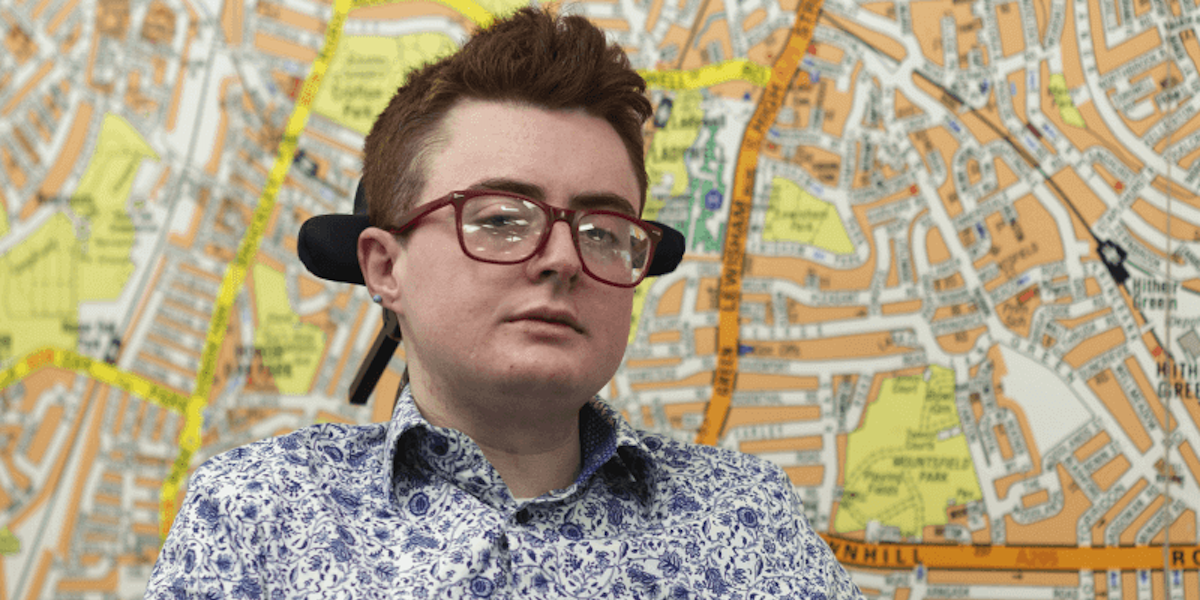In the first in a series of frontline responses to Covid-19, Jamie Hale explains the challenges facing disabled people – and their demands of the British government. Published in partnership with The World Transformed

By: Jamie Hale
As a disabled adult, I’ve been epidemic-watching for a while, getting increasingly worried about Covid-19 as it came closer. Now that wave is about to break over the UK, and intensive care units are already becoming overwhelmed.
I’m significantly impaired – reliant on a variety of pumps and equipment, from feeding tube to non-invasive ventilation machine – and at very high risk if I catch Covid-19. I’m also completely reliant on a 24/7 care package, from people who do everything from personal care and managing my equipment to supporting me in my work and personal life, organised through a scheme called direct payments, in which I am given the funding to employ and manage my own personal assistants.
While we’ve heard a lot about the risks of Covid-19 for older people, less has been said about younger and working-age disabled people. Like people over 70, many of us have been told to self-isolate, either for being at increased risk of catching it, or increased risk of complications if we do catch it. Not only us but also the people we live with also have to self-isolate or practice extreme social distancing.
Our own efforts will be in vain, however, if the government doesn’t step in and offer us the support we need, and that’s what’s currently lacking.
Disabled people have been given very little information on the risks we face or the steps we should take to mitigate those. How do you practice social distancing when you have care workers coming in and out of your house constantly?
Those of us living independently on direct payments haven’t been allocated any personal protective equipment or the funding to purchase it. This means I’m making face masks out of t-shirts, trying to make my own hand sanitiser, and putting disposable gloves through the wash. I’m spending lots of money on buying clothes for PAs to wear at work, doing extra laundry, and buying what equipment, hand soap, etc I can to try to stay safe.
I have no funding to offer sick pay. This means that my employees, if they get ill, have to choose between risking my life or being unable to pay their rent. This situation is not fair on either them or me – especially as some of the people I employ don’t even work enough hours to earn statutory sick pay.
Terrifyingly, the legislation that keeps disabled people living safely at home is now being removed. The government’s Coronavirus Bill will make changes to the Care Act 2014 which remove the legal duty on local authorities to provide care, except where not providing it would breach people’s human rights. This could, in one fell swoop, wipe out most of adult social care – with no guarantee it will ever be replaced.
As well as these threats, the effects of social isolation are also significant. I am unable to see the high-risk people I love, even if they become ill. I’m in work and while I’m lucky to be able to work from home, many disabled freelancers have seen their incomes evaporate, while employees facing four months at home may instead lose their jobs.
Amidst this, a series of demands are emerging from disabled people:
- Removing the suspension of the Care Act from the Coronavirus Bill, to protect our right to live independently in the community;
- Adequate pay (living wage) for personal assistants and carers who all work in inherently high-risk roles, including those working for care agencies as well as doing direct payment work;
- Funding for full sick pay for PAs and carers whether employed through care agencies, direct payments, or other measures so they aren’t forced by financial circumstances to come in when ill;
- Enough Personal Protective Equipment for PAs and carers working with disabled people, whether through agencies or direct payments, to be provided urgently and free of charge;
- Flexibility in using direct payment budgets to pay different people, pay people more, or buy equipment as needed during the pandemic;
- Extra care funding for disabled people who have to hire PAs and carers at short notice to cover shifts as people fall ill;
- A guarantee from the government that disabled people won’t be deprioritised for access to treatment for the complications of Covid-19, as is happening in areas where health systems are being overwhelmed.



